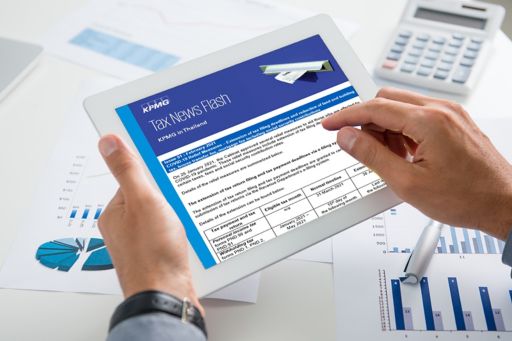Second phase of COVID-19 Relief Measures released
Tax & Legal News Flash Issue 67
The Government has released the second phase of relief measures to aid individuals and business operators affected by the outbreak of COVID-19. The Ministry of Finance expects to release further guidelines and conditions relating to these measures. Below is the outline of additional tax and other relevant measures.

Tax filing and payment extensions
- The deadline for annual corporate income tax return filing and payment (PND.50) for non-listed companies, that are required to submit the return and pay corporate income tax from 1 April 2020 to 30 August 2020, is extended to 31 August 2020. The Board of Investment also extends the submission of the application for corporate income tax incentive utilization to 31 July 2020 or at least 30 days before the annual corporate income tax filing deadline.
- The deadline for mid-year corporate income tax return filing and payment (PND.51) for non-listed companies, that are required to submit the return and pay mid-year corporate income tax from 1 July 2020 to 29 September 2020, is extended to 30 September 2020.
- The deadline for annual personal income tax return filing and payment (PND.90/91) is further extended from previously extended deadline of 30 June 2020 to 31 August 2020.
- The filing and tax payment deadline for other taxes collected by the Revenue Department, such as value added tax and specific business tax, will be extended for certain business operators. The extended deadline will be announced by the Ministry of Finance at a later stage. The businesses that are subject to this relief measure include:
- Businesses that are closed due to the order of the authorities; and
- Businesses affected by the COVID-19 outbreak in respect of which the Ministry of Finance will evaluate, on a case by case basis, whether a filing extension is justified.
- The deadline for excise tax form filing and payment occurring during the period from 1 March 2020 to 31 May 2020 is extended to 15 July 2020 for operators of excisable entertainment businesses that are temporarily closed due to the COVID-19 outbreak. The excisable entertainment businesses that are subject to this relief measure include:
- Night clubs, discotheques, pubs, bars, cocktail lounges, including places that sell food and alcoholic beverages with music or other entertainment performances; and
- Bathhouses, spas, massage parlors, gambling places, such as racecourses, and golf courses.
- Deadline of excise payment is extended for petroleum and petroleum-related business operators from the 10th day to the 15th day of the month following the month that petroleum or petroleum products are brought out of the factory or bonded warehouse. The extension is applicable for excise tax liabilities occurring from 1 April 2020 to 30 June 2020.
Tax relief measures for business operators
- Import duties on goods used for treatment, diagnosis or prevention of coronavirus infection (COVID-19) as per the list specified by the Ministry of Public Health will be exempt from the effective date of the Notification of the Ministry of Finance to 30 September 2020. The Notification is yet to be formally released.
- Loans amounting to THB 10 billion will be provided by Small and Medium Enterprise Development Bank to SMEs in a tourism sector, i.e. guided tours, spas, relevant transportation, hotels, accommodation and restaurants. Each SME will be eligible to apply for a maximum of THB 3 million loan with the interest rate of 3% per annum for the first two years. The repayment term is up to a maximum of five years. The loan application can be submitted by 30 December 2020.
- Rental payments for leases of state-owned property are extended to September 2020 for lessees who are tourism and tourism-related business operators.
- Jet fuel excise has been reduced from THB 4.726 per litre to THB 0.20 per litre for airlines operating domestic flights until 30 September 2020.
Tax relief measures for individuals
- The Government Savings Bank and the Bank for Agriculture and Agricultural Cooperatives provide emergency loans to individuals who are affected by the COVID-19 outbreak for THB 40 billion in total. Each individual is eligible to apply for a maximum non-secured loan of THB 10,000 with a fixed interest rate of not exceeding 0.1% per month and 6-month grace period for principal and interest payments. The repayment term must not exceed 2.5 years. The loan application can be submitted by 30 December 2020.
- Additional secured loans are provided by the Government Savings Bank to individuals with fixed income for THB 20 billion in total. Each individual is eligible to apply for a maximum loan of THB 50,000 with a fixed interest rate of not exceeding 0.35% per month and the repayment term must not exceed three years. The loan application can be submitted by 30 December 2020.
- The threshold for deductible allowance for health insurance premiums has been increased from THB 15,000 to THB 25,000 for the 2020 tax year onwards. The total deduction combined with life insurance premiums and life insurance savings must not exceed THB 100,000.
- Personal income tax is exempt on taxable income received by medical and public health personnel from the Ministry of Public Health in the 2020 tax year as compensation for the risk associated with COVID-19. The exempted taxable income includes:
- Compensation received for monitoring, investigating, preventing, controlling and treating COVID-19 patients; and
- Compensation received by non-government officials or government officials appointed by the Ministry of Public Health to provide medical advice in dealing with the COVID-19 outbreak.
Tax relief measures to support debt restructuring of non-bank creditors
Exemption of taxes and fees is provided to support debt restructuring of non-bank creditors, i.e. credit cards, personal loans, microloans and nano loans, provincial retail loans, hire purchase, leasing and other creditors entered into debt restructuring agreements with financial institutions for the debt restructuring incurred from 1 January 2020 to 31 December 2021. The details of tax exemption are as follows:
- Exemption of personal income tax or corporate income tax on income derived by debtors from debt forgiveness.
- Exemption of personal income tax, corporate income tax, value added tax, specific business tax and stamp duty for debtors and creditors on income derived from the transfer of assets, sale of goods, service provision and execution of dutiable instruments due to debt restructuring.
- Exemption of personal income tax, corporate income tax, specific business tax and stamp duty for debtors on income derived from the transfer of immovable property, which is mortgaged to guarantee the loan, to a person who is not the creditor, including the execution of the dutiable instrument due to the transfer of such immovable property. The debtor must use the income received from the transfer of immovable property to repay the loan to the creditor. The said exemption should be applicable to income up to the amount of the loan payable or the obligation under the debt guarantee agreement, subject to the conditions prescribed by the Director-General of the Revenue Department.
- Normal rules imposing conditions and restrictions for deduction of bad debts written off should not apply to creditors that write off forgiven debts as a result of debt restructuring.
- The fee for registration of the transfer or mortgage of immovable property and condominium with the Department of Land as a result of debt restructuring is reduced to 0.01% from the date that the respective Notification of the Ministry of Interior is published in the Royal Gazette (which is yet to occur) to 31 December 2021.
Employment relief measures
- The deadline for employers to submit compulsory social security forms and remit contributions is extended as follows:
- For the salary of March 2020, the deadline is extended to 15 July 2020;
- For the salary of April 2020, the deadline is extended to 15 August 2020;
- For the salary of May 2020, the deadline is extended to 15 September 2020.
- The rate for compulsory social security contributions by insured persons is further reduced from 4% to 1% for the three-month salary cycles from March 2020 to May 2020. The previously reduced rate of 4% will be applicable from June 2020 to August 2020. The rate of the contributions by employers will remain at 4% from March 2020 to August 2020 as previously announced.
For the details of COVID-19 relief measures (phase 1), click here
Key Contacts
- Benjamas Kullakattimas - Head of Tax, KPMG in Thailand
- Auaychai Sukawong - Partner, International Tax Services\
- John Andes - Partner, International Tax Services
- Lynn Tastan - Tax Partner, Global Compliance Management Services (GCMS)
- Malika Bhumivarn - Partner, Trade & Customs services
- Nipawan Passarapark - Tax Partner, Global Compliance Management Services (GCMS)
- Pornpen Eurpiyachat - Tax Partner, Global Compliance Management Services (GCMS)
- Tatiana Bespalova - Partner, International Tax Services
- Thanita Pubordeepong - Director, International Tax Services
- Visuth Apiraks - Tax Director, Global Compliance Management Services (GCMS)
- Waraporn Dhammasawangkij - Tax Director, Global Compliance Management Services (GCMS)
Connect with us
- Find office locations kpmg.findOfficeLocations
- kpmg.emailUs
- Social media @ KPMG kpmg.socialMedia




